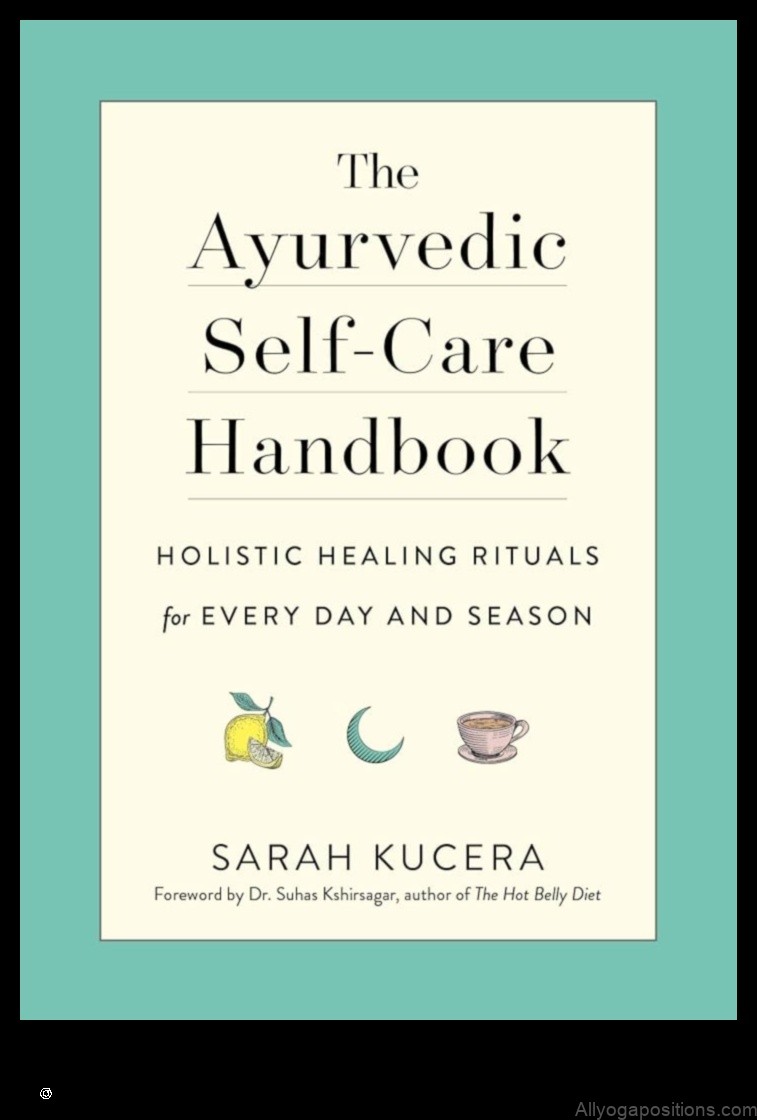
Yoga and Ayurvedic Self-Care Practices
Ayurveda is a holistic system of medicine that originated in India over 5,000 years ago. It is based on the belief that health is a state of balance between the mind, body, and spirit. Yoga is a mind-body practice that originated in India around the same time as Ayurveda. It is a way to connect with your breath, body, and mind. Yoga and Ayurveda can be used together to promote self-care and improve overall health and well-being.

Benefits of Yoga for Ayurvedic Self-Care
Yoga can help to promote self-care in a number of ways. It can:
* Reduce stress and anxiety
* Improve mood
* Boost energy levels
* Improve sleep
* Increase flexibility
* Strengthen muscles
* Improve balance
* Promote relaxation
* Connect you with your breath, body, and mind
How to Practice Yoga for Ayurvedic Self-Care
There are many different ways to practice yoga for self-care. The best way to find a yoga practice that is right for you is to experiment with different styles and teachers. Some things to consider when choosing a yoga practice include:
* Your fitness level
* Your interests
* Your budget
* Your schedule
Once you have found a yoga practice that you enjoy, it is important to make it a regular part of your self-care routine. The benefits of yoga are cumulative, so the more you practice, the more you will benefit.

Yoga Poses for Ayurvedic Self-Care
There are many different yoga poses that can be beneficial for self-care. Some of the most popular poses for self-care include:
* Child’s pose
* Downward-facing dog
* Savasana
* Bridge pose
* Warrior II pose
* Crescent lunge
* Half moon pose
* Standing forward bend
* Seated forward bend
These are just a few examples of yoga poses that can be beneficial for self-care. There are many other poses that you can try. The best way to find poses that are right for you is to experiment and see what feels good.
Ayurvedic Diet for Self-Care
Ayurveda emphasizes the importance of eating a healthy diet that is tailored to your individual constitution. The Ayurvedic diet is based on the principle of doshas, which are three different types of energy that are believed to make up the human body. The three doshas are:
* Vata
* Pitta
* Kapha
The Ayurvedic diet recommends eating foods that balance your doshas. For example, if you have a vata constitution, you should eat foods that are warm, heavy, and oily. If you have a pitta constitution, you should eat foods that are cool, light, and dry. If you have a kapha constitution, you should eat foods that are light, dry, and warm.
There are many resources available to help you learn more about the Ayurvedic diet and how to create a diet that is right for you. Some good resources include books, websites, and Ayurvedic practitioners.
Ayurvedic Herbs for Self-Care
Ayurveda also uses herbs to promote health and well-being. There are many different Ayurvedic herbs that can be used for self-care. Some of the most popular herbs include:
* Ashwagandha
* Turmeric
* Ginger
* Cinnamon
* Brahmi
* Gotu kola
* Shatavari
* Amla
Ayurveda practitioners can help you identify which herbs are right for you and how to use them safely.
Ayurvedic Lifestyle Practices for Self-Care
Ayurveda emphasizes the importance of living a healthy lifestyle in order to promote self-care. Some of the Ayurvedic lifestyle practices that can be beneficial for self-care include:
* Getting enough sleep
* Eating a healthy diet
* Exercising regularly
* Managing stress
* Spending time in nature
* Connecting with loved ones
* Practicing yoga and meditation
These are just a few of the many ways that you can incorporate Ayurvedic self-care practices into your life. By making small changes to your
| Topic | Answer |
|---|---|
| Ayurvedic Self-Care | Ayurvedic self-care is a holistic approach to wellness that emphasizes balance and harmony between the body, mind, and spirit. It includes a variety of practices, such as yoga, meditation, and diet, that can help to promote physical and mental health. |
| Yoga | Yoga is a mind-body practice that combines physical postures, breathing exercises, and meditation. It can help to improve flexibility, strength, balance, and overall well-being. Yoga is also a great way to reduce stress and promote relaxation. |
| Mindfulness | Mindfulness is a state of awareness in which you are paying attention to the present moment, without judgment. It can help to reduce stress, improve focus, and increase happiness. Mindfulness can be practiced through meditation, yoga, or other activities. |
| Stress Relief | Stress is a normal part of life, but too much stress can take a toll on your physical and mental health. There are many ways to relieve stress, such as yoga, meditation, exercise, and spending time in nature. |
| Wellness | Wellness is a state of physical, mental, and social well-being. It is important to take care of your overall health and well-being, including your physical, mental, and social needs. |
II. Yoga for Ayurvedic Self-Care
Yoga is a mind and body practice that originated in ancient India. It is based on the belief that the body and mind are interconnected, and that by practicing yoga, one can achieve a state of balance and harmony.
Yoga can be practiced for a variety of reasons, including stress relief, improved flexibility, and increased strength. It can also be used as a form of self-care for people with chronic conditions such as anxiety or depression.
Ayurveda is a traditional Indian system of medicine that emphasizes the importance of balance and harmony in the body. It is based on the belief that each person has a unique constitution, or doshas, which are made up of the elements of air, fire, water, and earth.
Yoga and Ayurveda can be combined to create a comprehensive self-care program that addresses the physical, mental, and spiritual aspects of health.
III. Benefits of Yoga for Ayurvedic Self-Care
Yoga has been shown to have a number of benefits for overall health and well-being, including:
- Reduced stress and anxiety
- Improved sleep
- Increased energy
- Enhanced flexibility
- Improved balance
- Strengthened muscles
- Improved cardiovascular health
- Reduced pain
- Improved mood
Yoga can also help to promote a sense of calm and relaxation, which can be beneficial for people who are struggling with stress, anxiety, or other mental health conditions.
In addition to these physical and mental benefits, yoga can also help to improve overall well-being by promoting a sense of connection to the body and mind.
IV. Benefits of Yoga for Ayurvedic Self-Care
Yoga has been shown to have a number of benefits for overall health and well-being, including stress relief, improved mood, and increased energy. These benefits can be helpful for people who are looking to improve their overall health and well-being, as well as those who are specifically looking for ways to improve their Ayurvedic self-care practices.
Specifically, yoga can help to balance the doshas, which are the three Ayurvedic principles that govern our physical, mental, and emotional health. By practicing yoga, we can help to bring our doshas into balance, which can lead to a number of benefits, including:
- Reduced stress and anxiety
- Improved sleep
- Increased energy
- Improved digestion
- Reduced pain
- Improved mood
- Increased flexibility
- Strengthened muscles
- Improved balance
Yoga can also be a helpful tool for managing chronic conditions, such as anxiety, depression, and chronic pain. By practicing yoga regularly, we can learn to manage our stress levels, improve our sleep, and reduce our pain. This can lead to a number of benefits for our overall health and well-being.
V. Yoga Poses for Ayurvedic Self-Care
Yoga poses can help to improve your physical and mental health, and they can also be used to promote a sense of well-being. Here are some yoga poses that are particularly beneficial for ayurvedic self-care:
- Shavasana (Corpse Pose): This pose is a great way to relax and de-stress. Lie down on your back with your legs extended and your arms at your sides. Close your eyes and focus on your breath.
- Balasana (Child’s Pose): This pose is a gentle stretch for the back and shoulders. Kneel on the floor with your feet together and your big toes touching. Lower your torso over your thighs and rest your forehead on the floor.
- Uttanasana (Standing Forward Fold): This pose is a great way to stretch your hamstrings and calves. Stand with your feet hip-width apart. Bend forward from your hips and reach your hands towards your feet.
- Adho Mukha Svanasana (Downward-Facing Dog): This pose is a great way to stretch your back and shoulders. Start in a tabletop position with your hands and feet shoulder-width apart. Inhale and lift your knees off the floor, then straighten your legs and reach your heels towards the ground.
- Bhujangasana (Cobra Pose): This pose is a great way to strengthen your back and spine. Lie on your stomach with your legs extended and your arms at your sides. Inhale and lift your head and chest off the floor, then press your hands into the ground and straighten your arms.
These are just a few examples of yoga poses that can be beneficial for ayurvedic self-care. If you are new to yoga, it is important to consult with a qualified instructor before starting any new practice.
VI. Ayurvedic Diet for Self-Care
The Ayurvedic diet is based on the principle of doshas, which are the three different energies that make up each person. The doshas are vata, pitta, and kapha.
The Ayurvedic diet aims to balance the doshas by eating foods that are specific to each dosha. For example, vata-pacifying foods include warm, cooked foods, while pitta-pacifying foods include cooling, light foods.
The Ayurvedic diet also emphasizes eating whole, unprocessed foods and avoiding processed foods, refined sugar, and excessive amounts of meat.
In addition to diet, the Ayurvedic diet also includes other self-care practices such as yoga, meditation, and massage.
VII. Ayurvedic Lifestyle Practices for Self-Care
Ayurveda is a holistic system of medicine that emphasizes the importance of living in harmony with nature. Ayurvedic lifestyle practices are designed to promote balance and well-being on all levels, from the physical to the mental and spiritual.
Some of the key Ayurvedic lifestyle practices include:
- Eating a healthy diet that is tailored to your individual constitution (dosha).
- Getting regular exercise that is appropriate for your fitness level and needs.
- Getting enough sleep.
- Managing stress through relaxation techniques such as yoga, meditation, and breathing exercises.
- Spending time in nature.
- Connecting with others in a meaningful way.
- Having a positive attitude and outlook on life.
By incorporating these practices into your daily life, you can promote overall health and well-being and reduce your risk of developing chronic diseases.
Ayurvedic Lifestyle Practices for Self-Care
VIII. Ayurvedic Lifestyle Practices for Self-Care
Ayurveda is a holistic system of medicine that emphasizes the importance of living in harmony with nature. This includes eating a healthy diet, getting regular exercise, and managing stress.
Here are some specific lifestyle practices that can help you improve your overall health and well-being:
- Eat a healthy diet that is based on whole, unprocessed foods.
- Get regular exercise that is appropriate for your fitness level.
- Manage stress through yoga, meditation, or other relaxation techniques.
- Get enough sleep.
- Spend time in nature.
- Connect with others in a meaningful way.
- Have a positive attitude and outlook on life.
By following these simple practices, you can create a healthy and balanced lifestyle that will help you to stay healthy and well.
IX. Conclusion
Yoga and Ayurveda are ancient healing modalities that can be used together to promote overall well-being. Yoga can help to improve physical health, mental health, and emotional well-being. Ayurveda can help to balance the doshas and promote overall harmony in the body. When practiced together, yoga and Ayurveda can help people to live healthier, happier lives.
X. FAQ
Q: What is Ayurvedic self-care?
A: Ayurvedic self-care is a holistic approach to wellness that emphasizes the mind, body, and spirit. It is based on the principles of Ayurveda, an ancient Indian medical system that has been practiced for thousands of years.
Q: What are the benefits of Ayurvedic self-care?
A: Ayurvedic self-care can help to improve your overall health and well-being by reducing stress, improving sleep, boosting immunity, and promoting relaxation.
Q: How can I incorporate Ayurvedic self-care into my life?
A: There are many ways to incorporate Ayurvedic self-care into your life, including:
- Eating a healthy diet that is based on your individual constitution
- Getting regular exercise
- Spending time in nature
- Practicing yoga and meditation
- Using essential oils
Table of Contents
Maybe You Like Them Too
- Yoga for Teens 5 Poses to Build Emotional Resilience
- Meditation and Self-Discovery Unravel the Layers of Your Being
- Yoga for Strength Power Poses to Build Strength, Flexibility, and Confidence
- Mindfulness Meditation in Yoga A Guide to Stilling the Mind and Finding Inner Peace
- Empowerment Embark Yoga for Courageous Beginnings
